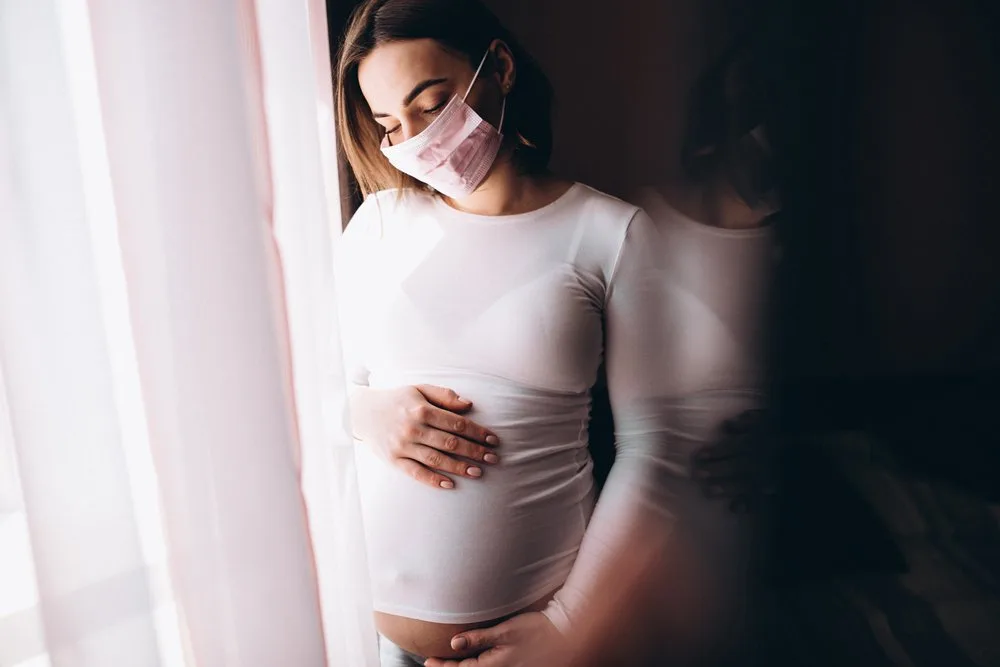Palesa Tshabalala had that pregnancy glow, common among first-time mothers. Basking in the journey that was her first pregnancy, she found herself with a busy schedule. This included preparing for her pregnancy photo shoot, baby shower, antenatal classes, and all the other exciting parts of being a new mom. However, just as she reached 27 weeks, the country went into lockdown.
“I became super-paranoid about handwashing and staying indoors,” shares the new mother. “That just added to my stress and all the uncertainties that came with the lockdown.”
Staying healthy and safe during pregnancy is enough of a struggle; now there’s a pandemic to deal with too.
Pregnancy in the time of COVID
Under normal circumstances, an expectant mother will have a million thoughts racing through her head. These soon multiply as she tries to navigate her way through a pandemic.
In addition, many couples hoping to start a family these past few months have given up trying, thinking that the complications brought on by the lockdown are far too many. However, this doesn’t have to be the case! Women who have fertility problems can try home insemination – it’s a fertility treatment that you can do on your own, in the comfort of your home, without the need to visit a doctor’s office. This solves the problem of having to leave your house and be exposed to the virus, or of having to deal with the uncertainty of whether your doctor’s office will be open or not.
“I had so many concerns when the lockdown was first implemented. The main one being whether my husband would be able to join me for the last few doctor’s appointments, as well as the birth of our baby. Especially since we were at the very end of my pregnancy when lockdown Level 5 was implemented,” says Janice Kisten-Rattay, who gave birth to a healthy baby girl, her third child, on 2 April. “I was 37 weeks when lockdown Level 5 was implemented. We tried to take it day by day, so as not to get stressed out.”
And expectant mothers weren’t the only ones who were worried when the lockdown was implemented; doctors, obstetricians, and gynecologists also had concerns.

Lordn/Shutterstock
“My main concern was that many people, women, and children especially, would not be able to access healthcare,” says Dr. Shastra Bhoora, Fellow of Maternal Critical Care at Charlotte Maxeke Johannesburg Academic Hospital. “Those who did access healthcare were at an increased risk of contracting the virus from a healthcare facility, and taking it back home to their community.”
The delivery room during a pandemic
In order to curb the rate of infection, new rules and regulations had to be implemented everywhere. That said, the hospital delivery room was no different.
“Private hospitals restricted patient visitor access. These additional precautions have been implemented to limit the number of persons entering hospitals, in order to minimize the risk of exposure to patients in the hospital, as well as to nurses, doctors and others working in our hospitals,” explains Dr. Antonio Rodrigues, reproductive medicine specialist and director of Medfem Fertility Clinic and Intercare Medfem Hospital.
“If the mother-to-be has booked a private room, her husband/birth partner can stay in the room with her. Both must be symptom-free and they can’t leave the hospital. However, in the case of mothers who are in a general ward, her birth partner can attend the delivery and stay with the mother until she is transferred to her ward.
“Only one parent is allowed to visit the nursery or neonatal intensive care unit (NICU) at a time. This is on the condition that the person visiting has had no COVID-19 exposure, and accepts the very strict infection-prevention controls that have been put in place to minimize the risks to their baby or other babies and parents. No other visitors are generally allowed to visit,” Rodrigues says.
But while all these rules and regulations are meant to ensure everyone’s safety, it still doesn’t make it easier on the expectant mother.
Prepartum and Postpartum Mental Health
“Pregnancy is an emotional time, and patients are anxious about the possible risk to themselves and their baby,” says Dr. Amy Wise, sub-specialist of maternal and fetal medicine at Rahima Moosa Mother and Child Hospital.
“Initially, the information suggested that the risk to pregnant women wasn’t very different from the rest of the population; however, emerging evidence has shown that there may be an increased risk of growth restriction and that certain groups are more at risk of severe diseases – such as those who are obese. These health concerns are worrying for women and their families. Anxiety about separation from loved ones and their risk of contracting the illness in a health facility must be discussed with them. Women whose mental health is at risk need to be referred to the appropriate services.”
Mental health on expecting mothers

Africa Studio/Shutterstock
Both Janice and Palesa experienced deliveries that were quite taxing on their mental health.
“As much as the hospital tried to make it as comfortable as possible, going in for a C-section normally makes me anxious, as any operation would, so adding the pandemic to the mix made it nerve-wracking,” says Janice, who adds that her husband got to see her only once both she and the baby were discharged, and her sons could see their new sister only via video call. Suffice it to say, the experience wasn’t the most pleasant.
“Being in the hospital was lonely, as you had no visitors. I missed the excitement I had with my first two pregnancies: flowers, balloons, and excited faces to see the new arrival. I was lucky enough to be put in a room with another mom. The next day we got to chatting, which kept me occupied, until she was discharged later that day and the loneliness started to settle in. This is when I pined for my hubby. So, I used this time to bond with the baby. Sure, the nurses popped in to see if everything was okay from time to time, but by the time I was discharged on day three, I couldn’t wait to get home.”
Not only was new mom Palesa going through her first pregnancy, in a pandemic no less, but she also went into preterm labor at 33 weeks
“I wasn’t allowed visitors in the hospital because of the COVID-19 restrictions,” she says. “I hadn’t even prepared a hospital bag or bought baby clothes at the time. That week was a scramble, and subconsciously I felt like an unprepared (irresponsible) parent, even though it was beyond my control.”
What does COVID-19 mean for newborns?
“Previous pandemics of the Influenza H1N1, SARS and MERS have all yielded poor clinical outcomes for mothers and babies. It’s for this reason we are exceedingly cautious with the care of pregnant women and newborn babies,” explains Bhoora.
While the rate of vertical transmission has yet to be proven, there is still a concern whether a potentially infected mother can infect a newborn baby after labor.
“With an immature immune system, a newborn is susceptible to illness. However, the research has thus far shown the risk to be very low (<3%),” says Wise. “There have been case reports of neonates that appear to have been affected prior to delivery. The majority who were infected, though, were so after delivery via respiratory droplets.”
It’s because of this that parents need to take the proper precautions when caring for their newborns and introducing them to the outside world.
“Close observation of hygiene, including washing hands regularly, is important among all members of your household, and they should be careful when holding your baby if they have symptoms suggestive of any illness,” advises Rodrigues. “Anyone from outside your household who enters your home should pay stringent attention to hygiene precautions and follow social-distancing guidance.”
He also cautions against large family gatherings celebrating your baby’s arrival, until more is known about the spread of the virus in the community. What’s more, it’s imperative that you seek medical advice if your baby has a fever, lethargy, irritability, poor feeding, or any other symptoms you may have concerns about.

Prostock-studio/Shutterstock
Has the pandemic killed baby fever?
Bringing a child into the world is no easy decision, and if you had plans to have a baby, the pandemic may have given you second thoughts. That’s perfectly normal.
“The National Department of Health has recommended that women, particularly younger women, consider delaying their pregnancy until after the pandemic, and I agree with this,” says Prof Priya Soma-Pillay, professor and head of the Department of Obstetrics and Gynecology at the University of Pretoria and Steve Biko Academic Hospital.
“If women can, they should delay becoming pregnant until after the pandemic, as it will limit risks for both mother and baby. This is especially important for women with co-morbidities. However, for some women, particularly those with reduced ovarian reserve, this may not be possible.”
Adds Rodrigues: “If you are over 35 or have been diagnosed with infertility at any age, it’s better to manage your fertility now. So, if you are worried about being pregnant now, you have the option of freezing your eggs or creating embryos now with IVF treatment. You can then transfer the embryos when you feel comfortable. My main message is that women should remember one thing: unfortunately, their fertility decreases with age.”
How can I have a healthy pandemic pregnancy?
When you’re pregnant, you’re responsible for the wellbeing of both you and your unborn child. Therefore, you need to take proper care of yourself.
Soma-Pillay advises that you follow all the guidelines on staying safe, including social distancing, the appropriate use of face masks, and hand hygiene. Additionally, to reduce the risk of blood clots in pregnancy, she advises that pregnant women stay mobile and hydrated.
“Pregnant women should have regular exercise, eat a healthy, balanced diet, and take folic acid and multivitamin supplements. It’s important for pregnant women to attend all antenatal visits and have a pregnancy scan for safety precautions. Only avoid them if your doctor has advised you not to attend,” she adds.
As for what to do if you’re expecting and you believe you may have been exposed to the coronavirus?

Dragon Images/Shutterstock
“If you’re pregnant and you have a high temperature or a new, continuous cough, or a loss of or change to your sense of smell or taste, you should stay at home for 10 days. You should contact your obstetrician or clinic to discuss further management,” advises Rodrigues.
“Be alert to the other possible causes of fever in pregnancy – in particular, urine infections (cystitis) and water breaking. If you experience any burning or discomfort when passing urine, or have any unusual vaginal discharge, or have any concerns about your baby’s movements, contact your maternity care provider as soon as possible, who will be able to provide further advice.
“If you feel your symptoms are worsening or if you are not getting better, this may be a sign that you are developing a more severe infection that requires specialized care. Contact your obstetrician or GP to get further management.”
This advice is especially important for those who are at a higher risk. This includes women who are:
- in their third trimester
- over the age of 35
- overweight
- obese
- have pre-existing medical problems, such as high blood pressure or diabetes
Can I breastfeed during COVID?
The answer is always a resounding yes.
“Breastfeeding during this time is incredibly important. The baby needs the antibodies from the mother’s milk to help prevent infections, as well as the nutritional value. This is not possible with formula feeding,” explains Wise.
But you need to make sure you do it safely. Rodrigues recommends the following precautions:
- Wash your hands before touching your baby, breast pump, or bottles;
- Try to avoid coughing or sneezing on your baby while feeding at the breast or from a bottle;
- Consider wearing a mask or face covering while feeding;
- Follow recommendations for pump/bottle cleaning after each use; and
- Consider asking someone who is well enough to feed your expressed breast milk or baby formula to your baby.
Pandemic or not, becoming a mother is a blessing. It’s important not to let what you can’t control take away from the joy of bringing life into the world.
“My mantra is IT’S OKAY. When you can’t share the joy with your loved ones as planned, IT’S OKAY” says Palesa, who has clearly put the stress of her unplanned delivery behind her. “The things you can control should be where your focus lies. Take your vitamins, pack your hospital bag early, and make YouTube your midwife well in advance!”
Note: At the time of writing, South Africa was still under Level 3 lockdown restrictions. Nonetheless, it remains important to abide by safety regulations and remain vigilant.



![women [longevity live]](https://longevitylive.com/wp-content/uploads/2020/01/photo-of-women-walking-down-the-street-1116984-100x100.jpg)










